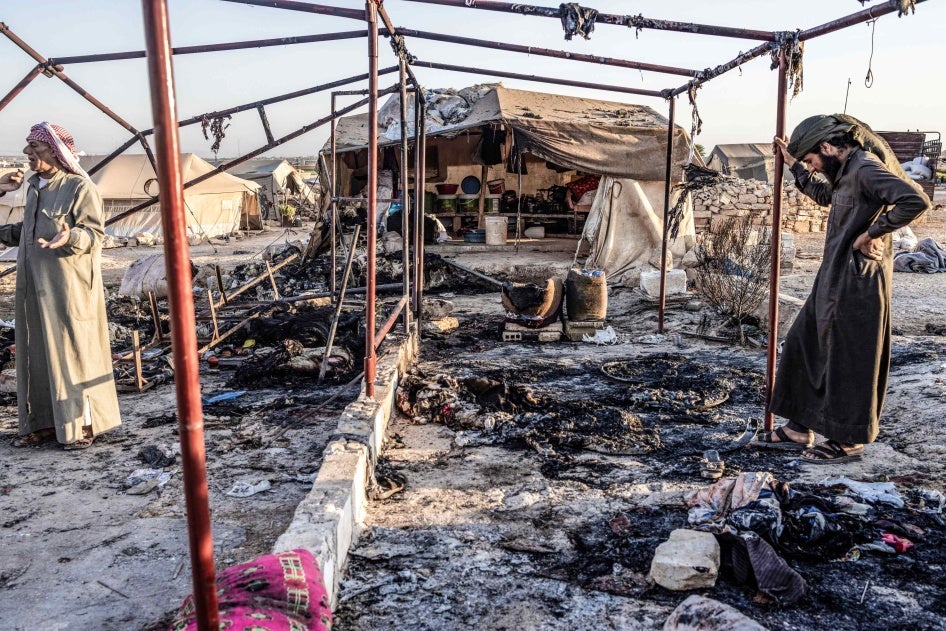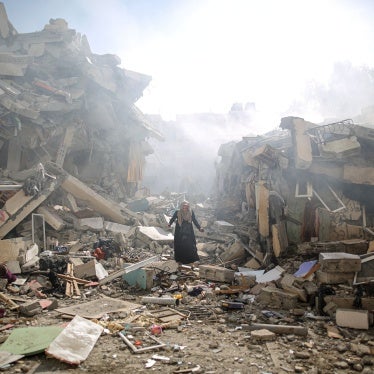(Beirut) – In 2023, civilians in Syria faced another year of grave abuses perpetuated by the Syrian government and other parties to the conflict as the country grappled with an acute economic crisis, Human Rights Watch said today in its World Report 2024.
Across the country, Syrians are facing a severe humanitarian crisis, with over 90 percent living below the poverty line. Although Syria remains unsafe, and hostilities are on the rise, refugee hosting countries like Turkey and Lebanon continued unlawful deportations and large-scale returns of thousands of Syrians to different parts of the country.
“Pounded by economic collapse, a devastating earthquake, and ongoing abuses by warring parties, civilians in Syria are increasingly in need of protection and humanitarian aid,” said Adam Coogle, deputy Middle East director at Human Rights Watch. “No country should consider returning refugees to Syria while unsafe conditions persist.”
In the 740-page World Report 2024, its 34th edition, Human Rights Watch reviews human rights practices in more than 100 countries. In her introductory essay, Executive Director Tirana Hassan says that 2023 was a consequential year not only for human rights suppression and wartime atrocities but also for selective government outrage and transactional diplomacy that carried profound costs for the rights of those not in on the deal. But she says there were also signs of hope, showing the possibility of a different path, and calls on governments to consistently uphold their human rights obligations.
In government-held areas of Syria, security forces continued to subject residents, including returning refugees, to arbitrary arrest, torture, enforced disappearances, harassment, and extortion, while millions could not find or afford enough quality food due to the Syrian government’s diversion of aid, failure to equitably address a debilitating economic crisis brought on by the destruction of infrastructure and crises in neighboring countries, and the effects of expansive international sanctions on the economic rights of Syrians. Despite its failure to cease abuses or initiate reforms, Arab states readmitted Syria to the Arab League.
In early September, Syrian President Bashar al-Assad abolished the notorious military field courts, where thousands of people are thought to have been sentenced to death without due process and referred all pending cases to the military judiciary, raising concerns that the decision may lead to the erasure of court records and other evidence related to enforced disappearances.
In Idlib, indiscriminate attacks by Syrian-Russian military forces on civilians and critical civilian infrastructure persisted in 2023, including use of prohibited weapons such as cluster munitions and incendiary weapons.
In July, the UN Security Council failed to renew the cross-border aid mechanism for Syria when Russia vetoed a resolution on its continuation, closing a nine-year-old avenue for delivering humanitarian assistance to non-government-controlled parts of northwest Syria without the Syrian government's consent.
Turkish Armed Forces stepped up attacks on areas in the northeast under the control of Kurdish-led forces, destroying critical infrastructure and resulting in water and electricity disruptions for millions of people.
The Syrian Democratic Forces (SDF), a US-backed Kurdish-led armed group that controls much of Northeast Syria, continued to arbitrarily detain civilians, including journalists, according to a September 2023 UN report that also documented deaths in detention in Hasakeh and Raqqa central prisons.
Despite nearly 4,000 repatriations to about a dozen countries through mid-November 2023, the SDF and Asayish regional security forces continued to arbitrarily detain at least 60,000 ISIS suspects and family members from Syria and nearly 60 other countries, most of whom are children, in life-threatening, degrading, and often inhumane conditions.
On June 8, 2023, the Netherlands and Canada filed a case at the International Court of Justice alleging that Syria is violating the International Convention Against Torture. The court held hearings in October on the Netherlands and Canada’s request for provisional measures. On November 16, it issued its order, directing the Syrian government to take all measures within its power to prevent acts of torture and other abuses.









